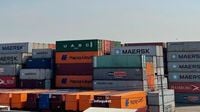In a significant development for Thailand's export sector, Thanagorn Kessatatsuwanna, the President of the Thai International Freight Forwarders Association (TFFA), revealed the results of a recent survey conducted among exporters regarding the impacts of the United States' reciprocal tariff measures. This survey, carried out from April 9 to April 22, 2025, indicated a mixed bag of effects on Thai exporters, with some reporting positive outcomes while others faced challenges.
According to the findings, certain groups of exporters have not yet felt the brunt of the tariff changes, while others have experienced increased orders and expedited delivery schedules. However, a significant portion reported negative impacts, including reduced orders, cancellations, and the burden of increased tariff costs being passed down from customers. In response, Thai exporters are employing various strategies to mitigate these challenges, such as negotiating with clients to share the tax burden, adjusting product prices based on who pays the tariffs, and delaying order acceptance to gauge the situation.
Furthermore, the survey revealed that over 88.9% of exporters do not plan to invest in the United States due to high costs, while 11.1% already have parent or subsidiary companies in the U.S. Among those surveyed, only 31.6% import raw materials from the U.S., such as soybeans and machinery, opting instead for cheaper sources or local materials.
The TFFA has urged the Thai government to closely monitor potential influxes of goods from countries impacted by the U.S. tariffs, particularly in sectors like electronics, toys, automotive parts, and household appliances. To safeguard domestic industries, the TFFA proposed several measures, including stringent import regulations to prevent low-quality goods from entering the country and a review of investment incentives for new ventures.
"We expect that while the export figures for Thailand may remain strong in the second quarter, there could be a significant drop in orders in the latter half of the year as importers have stockpiled goods," noted Ms. Sununta Kangwankulkit, Director-General of the Department of International Trade Promotion. The department has outlined 510 export promotion activities for the fiscal year, aiming to generate a total trade value of 92.36 billion baht, benefiting over 261,804 businesses.
As the trade landscape evolves, Thai exporters remain vigilant, seeking new markets and adjusting their strategies to adapt to changing conditions. "Every crisis presents an opportunity; it’s about how we seize those opportunities," Ms. Kangwankulkit added, emphasizing the resilience of Thai exporters.
In a related development, Saudi Arabia's non-oil exports have surged to a record high of 5.15 billion riyals (approximately 1.3729 billion dollars) in 2024, reflecting the kingdom's ongoing efforts to diversify its economy under the Vision 2030 framework. Abdularahman Althukair, CEO of the Saudi Export Development Authority, attributed this growth to the country's commitment to reducing reliance on oil and promoting various industries, including tourism and manufacturing.
The increase in non-oil exports, which rose by 13% year-on-year and more than doubled since the launch of Vision 2030, underscores Saudi Arabia's significant strides in economic diversification. The kingdom aims to attract over 100 billion dollars in foreign direct investment annually as part of its long-term strategy. In 2024 alone, Saudi Arabia successfully drew in 7.76 billion riyals (2.069 billion dollars) in exports, marking a substantial increase compared to the previous year.
As both Thailand and Saudi Arabia navigate the complexities of international trade, the emphasis on economic diversification and strategic negotiations remains paramount. The Thai government's proactive stance in addressing tariff challenges and Saudi Arabia's ambitious Vision 2030 plan illustrate the dynamic nature of global trade and the importance of adaptability in the face of evolving market conditions.




